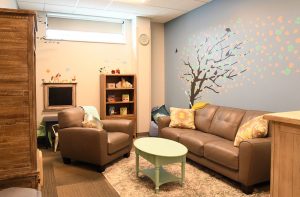
Before the Interview:
Prior to the official interview, a member from our team will contact you to explain the interview process, give you directions to our center, and answer any questions you may have. This is also an opportunity for us to learn more about your child and provide the interviewer with any information you feel is important for them to know.

The Forensic Interview:
The forensic interview is conducted by one of our trained forensic interviewers who specializes in talking and interacting with children, teens, and vulnerable adults in a neutral, supportive, non-leading way. The interview will take place in our forensic interview room. All interviews conducted at the Child and Family Advocacy Center are video-recorded and observed by professionals who are part of the multidisciplinary team in charge of the investigation. The team will observe from a separate room; this is done to minimize the number of times that individual will have to share their story.
Because the forensic interview is part of an ongoing investigation, it is important that the interviewer speak with your child alone. Often times, children may look to their caregiver to answer questions for them if they are present. It can also be difficult for children to openly share information regarding their experience with a caregiver in the room, or if they know a caregiver is watching. It can also be difficult for caregivers to hear the details of that experience.

While Your Child is Being Interviewed:
You will meet with one of our Child and Family Advocates who will take the time to listen to your concerns and provide support tailored to your needs. The advocate can offer information and resources on a variety of topics including the dynamics of sexual abuse, the impact of trauma, and the investigative and legal process. They are also available to discuss safety planning, protective orders, and can assist with referrals to mental health services, medical care, and other community resources that may be helpful for you and your child.
After the Interview:
Law enforcement or child protection may meet with you to discuss the interview and inform you of what next steps in the investigation are necessary. You will have the opportunity to ask questions or voice any concerns you may have as well.

How to Prepare Your Child for the Interview:
Let your child know that they will be visiting a safe and comfortable place to meet with someone who helps children talk about difficult things. Give them permission to talk openly with the interviewer and let them know it is important for them to be truthful. Assure them they are not in any trouble for talking about what happened.
This can be a very emotional and confusing experience for a child; it is important as a caregiver to be calm, supportive, and available to listen. If your child brings up the topic, try not to ask any detailed or leading questions about what happened and encourage them to use their own words when talking with the interviewer. If you have any questions on what to say or how to talk with your child before the interview, reach out to one of our advocates and they can offer you support.
What Else:
Try To:
- Have your child well rested before the interview
- Provide them with a meal or snack
- If they have a comfort item, encourage them to bring it with
Try NOT To:
- Coach or tell your child what to say
- Promise treats or rewards for talking with the interviewer
